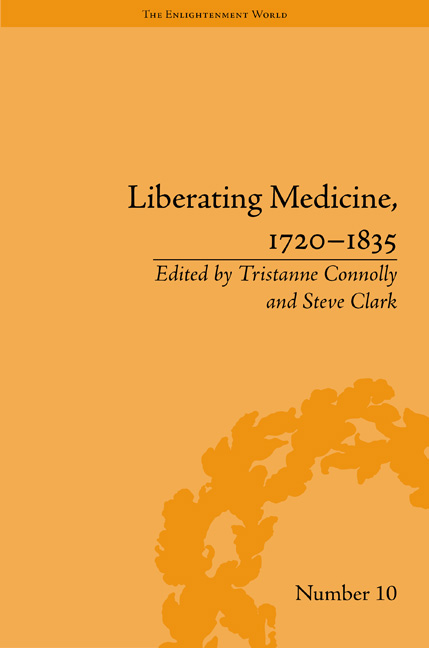Book contents
- Frontmatter
- CONTENTS
- Acknowledgements
- Contributors
- List of Figures
- Introduction
- I Spiritual Sickness and Hypochondria
- 1 Liberation and Consumption: Disease, Imperialism, and the Conversion of the Heathen in Hemans, Sigourney and Stowe
- 2 Freedom, Health and Hypochondria in Ignatius Sancho's Letters
- 3 ‘Uncle-Tommery’: Slavery and Romantic Medicine in Thomas Carlyle and Harriet Beecher Stowe
- II Health and Emancipation
- III Madness
- IV Anatomized and Aestheticized Bodies
- V Birth
- Notes
- Works Cited
- Index
2 - Freedom, Health and Hypochondria in Ignatius Sancho's Letters
from I - Spiritual Sickness and Hypochondria
- Frontmatter
- CONTENTS
- Acknowledgements
- Contributors
- List of Figures
- Introduction
- I Spiritual Sickness and Hypochondria
- 1 Liberation and Consumption: Disease, Imperialism, and the Conversion of the Heathen in Hemans, Sigourney and Stowe
- 2 Freedom, Health and Hypochondria in Ignatius Sancho's Letters
- 3 ‘Uncle-Tommery’: Slavery and Romantic Medicine in Thomas Carlyle and Harriet Beecher Stowe
- II Health and Emancipation
- III Madness
- IV Anatomized and Aestheticized Bodies
- V Birth
- Notes
- Works Cited
- Index
Summary
What are the connections between emancipation and Romantic medicine in an era in which discourses of slavery and abolition increasingly took hold of a medicalized rhetoric that invested the care or neglect of slaves with political potential? Anti-slavery deployments of sympathy and sentiment are importantly shaped by medical discussions of the body that draw upon a doubled history of the therapeutic treatment of individuals and a post-Enlightenment project of producing and policing the body as an object of knowledge. Medically caring for bodies at the turn of the nineteenth century is, in part, then, a continual process of setting out the terms by which individuals become intelligible as conventionally healthy or threateningly sick. This means speaking about a medicalized discourse rather than medicine as such, in recognition that the effects of Romantic medicine come from sources that include the ministrations of the physician at the bedside, but also from medical manuals that sought to inculcate in readers best practices for the preservation of well-being, and cultural forms that normalized a morality of health, such as the contested recognition of whether and to what degree slaves merited medical care, among many other points within Romantic culture, science, philosophy and politics. The social and individual effects of such medicalized discourse are not always predictable or even consistent. Anti-slavery advocates sought to activate the therapeutic potential of Romantic medicine as an affective social force to argue Africans in the British Empire deserved medical care and humane treatment. Yet this social function was also understood as instrumental rather than sympathetic by pro-slavery proponents who promised that improvements in care could maximize the value of forced labour in the colonies without leading to the amelioration or abolition of slavery. Is it possible to distinguish these two outcomes? Is it possible to hear something else, something that is neither paternalistic nor imperialistic yet still takes its force from a potential for liberation that is linked inextricably to Romantic medical culture? I propose here to consider how the Anglo-African Ignatius Sancho uses a particular and insistent affirmation of his unsound health to examine what it means to invoke the codes of Romantic medicine to articulate himself as a free subject.
- Type
- Chapter
- Information
- Liberating Medicine, 1720–1835 , pp. 27 - 40Publisher: Pickering & ChattoFirst published in: 2014

